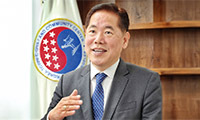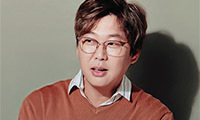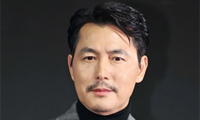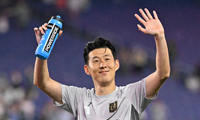THE LIFE AND TIME OF A MOST UNLIKELY HARVARD GRADUATE:
▶ Commentary
▶ A Silent Ghetto Healer
The future of a child born of the Korean womb is already programmed at birth-bound for Harvard. Most Korean moms would gladly give their own right arms to have their children enter the narrow gate to that ultimate success.
The Harvard mystique-the key that opens the door to fame and fortune-runs deep in the Korean and Korean American psyche: SAT, Harvard, six-digit-figure income, Ph.D.s and M.D.s, Wall Street addresses, CEOs, tenured professorships and a Mercedes-Benz
Korean cram schools for admissions to Harvard, Yale and Princeton in that order make up a thriving enterprise in major Korean settlements across the continent. Educational tours of select Ivy League colleges are annual affairs. And preparatory schools make appeals to immigrant parents through ads in ethnic dailies, which also run daily sections on prestige colleges.
Many parents have gone to the extreme by naming their sons (never daughters) Harvard and Yale as an abiding psychological incentive. I personally know at least three sons who bear the names of Harvard.
The crowning jewel of the Harvard moniker belongs to Harvard Jee, former honorary co-chair of the National Democratic Convention in San Francisco and fugitive from justice for defrauding three banks in California of $34 million.
The Democratic National Committee’s announcement of Jee’s co-chairmanship appointment was aimed at helping Jee raise at least $350,000 from the Asian American community..
The mystery international businessman with alleged ties to the dreaded Korean Central Intelligence Agency (KCIA) had nursed a lifetime ambition of making it to Harvard-without success. Instead he was, as a steadfast fund-raiser, linked to the presidential campaigns of Walter Mondale, as well as to former House Speaker Thomas P. "Tip" O’Neill, Jimmy Carter’s 1976 and 1980 presidential campaigns and to former California Gov. Jerry Brown, the late Sen. Alan Cranston and other politicians.
Jee was indicted on 15 federal counts of cheating Bank of Lloyds and Korea Exchange Bank and Hanil Bank, Ltd. to the total tune of $34 million, a week after a three-part series of exposes on the intricate machinations of the aspiring Harvardman was published in the now-defunct Sacramento Union. It wasn’t until The Union’s investigative reporters began looking into Jee’s affairs that the Democratic committee announced that Jee’s appointment had been both premature and a mistake.
At one bankruptcy hearing, the judge said it appeared that Jee was deliberately trying to "cheat, steal and defraud."
Shortly he fled to South Korea then under military strongman Chun Doo Hwan and has been reported being seen on both sides of the Pacific. Some in the Asian ethnic media began referring to the mess as "Harvardgate" which still remains unresolved.
And another kind of Harvardgate with new high-tech trappings is brewing.
In the past decade, to my unbelieving eyes, I came to bear witness to the rapid rise of neo-Yangbans (read neo-Mandarins) emerging from the breeding grounds of Harvard and other Ivy-League colleges at a time when the other Korean America-seething and-bleeding-cries out for defenders, fighters and healers for social and racial justice.
No matter. I count it my blessing that I have been a secret Boswell of a remarkable young woman from Harvard whose life has come to demonstrate the very opposite of that Harvard elitism so long embedded in the Confucian mindset of not only Korean but other Asian Americans.
Her name is Joan Kim, a friend, mentor, tutor and healer among the most wretched people in America’s inner-cities, who has been a source of inspiration for this aging FOB.
Joan Kim would easily qualify for the ideal candidate for the Harvard model: Whitney High School, valedictorian, National Merit Scholar, Robert C. Byrd Honors scholar, Los Angeles Times Outstanding Student Award.
After Harvard, the world would be her oyster.
One scorching June afternoon, a decade ago, a skinny, shy girl slung with a huge shoulder bag tiptoed into my dingy cluttered newsroom in Koreatown and, in an inaudible whisper, asked for an intern job during the summer break. She said she was just out of high school and college-bound that fall. At first glance I was struck by her ethereal quality-a wispy figure as fragile as a flower petal. In a curious way I felt a spiritual presence. (And my newshound’s sense turned out to be on target.)
Those were unsettling times with escalating "black-Korean conflict" fanned by marathon race baiting by the local media. Commonplace were everyhour shootings and robberies and everyday murders haunting "holes-in-the-wall" mom and pop storekeepers in the mean streets.
By the end of that summer, Joan Kim proved to be the best among some 20 interns, mostly Ivy League students and graduates, and much older regular staff members. For her age, she had produced extraordinary stories for the initial editions of the Korea Times English Edition weekly, which debuted on Aug. 15, the liberation day.
Her investigative pieces on festering inner-city gangs and violence, rapidly shifting demographies and inter-ethnic conflicts continued to be front-page attractions throughout her all too-brief summer stint. For days and nights, she would disappear into the turf-war territories and came up with the first insider view of the Koreatown-grown gangs. What unnerved this veteran crime reporter most was her utter disregard of the ever-lurking danger in the nation’s most violent Wilshire District that embraces Koreatown. She was utterly fearless-almost to a reckless degree.
Seeing was believing. I was invited to one of her many sittings with her gangbangers only to find her serenely at home with her trusting subjects as if she had been their lifelong buddy and sister. And she was turning 18 years old.
Come September, she was gone with the wind. Bound for Harvard. Soon came Sa-ee-gu and the demise of the weekly English Edition. I was in semi-hibernation after a liver transplant.
Four summers later, I heard from her that after Harvard she had settled with a social engineering job at Price Waterhouse in the nation’s capital but decided to move ahead for a medical missionary career.
"UC San Diego School of Medicine," she wrote in August 1996, "accepted me for the upcoming year, largely because of your letter of recommendation.
"However, I won’t be going this year. Another door opened-one that might interest you. A Korean merchant named Joon Park bought a strip bar/parlor right above his (discount) store and turned it into a taekwondo studio (on 14th Street NW).
"He did it for the low-income kids in the neighborhood (who are mostly African American). Since the kids can’t pay, he’s paying their scholarships. He hired a sixth degree blackbelt with a master’s degree in theology to teach.
"The Washington Post did a story on him last week. They interviewed the neighbors, who said that they could really see a difference in those kids. Mr. Park simply said that he wanted to be a good friend and offer a more constructive alternative to the streets.
"This Mr. Park used to go to our (Global Mission) church. Our church has been looking for the ways to become more involved in the community and reach out to other ethnic groups in our local area.
"We talked to Mr. Park’s son (Steve), who manages the studio. Steve reported that the studio had just re-opened, that they were forming great relationships with the kids and the parents. A community was forming there, Steve said. The family sees this as their ministry, a way of sharing God’s love to their neighbors. They are working to help bring racial reconciliation.
"Steve also said that they really want to start an after school/tutoring program for the kids in the neighborhood, to get them off the streets. This is where our church could come in. However, right now, no one has stepped forward to lead our church’s efforts in community outreach.
"I left Price Waterhouse last week, planning to go to medical school. However, after our meeting with Steve three days ago, my plans have changed!
"The decision was really, really tough for me. What clinched it was a question my friend asked me-"What would Jesus do?" My answer was immediate-"He’d be working with those kids." That made my decision clear.
"I’m not going back to Price Waterhouse since it just takes too much time. I can’t do both. I’ll be looking for flexible/part-time work pretty soon so that afternoons could be free for me to volunteer.
"However, for now, I’m just praying, and starting to talk with others to start moving our church into our community.
"This is really exciting. Thanks for your example, which has always inspired me to become more involved in race relations in our cities. I’ll keep reporting as things develop!
"Hope your health is holding up. Please take good care of yourself. Love, Joan Kim (with a smile sign)."
That was five summers ago-just the beginning of a long journey into the darkest heart of America. And her UNICEF card informing me of her deliberate decision opened my eyes to the hidden side of Joan Kim, the Harvard prototype.
And this latter-day Joan of Arc is not alone. She’s very much part of the underground urban revolutionary movement with love silently under way in pockets of the bleak urbanscape of this country.
Stay tuned for the next columns, especially for those Korean moms who still dream of the American Dream in crimson color.
스마터리빙
more [ 건강]
[ 건강]이제 혈관 건강도 챙기자!
[현대해운]우리 눈에 보이지 않기 때문에 혈관 건강을 챙기는 것은 결코 쉽지 않은데요. 여러분은 혈관 건강을 유지하기 위해 어떤 노력을 하시나요?
 [ 건강]
[ 건강]내 몸이 건강해지는 과일궁합
 [ 라이프]
[ 라이프]벌레야 물럿거라! 천연 해충제 만들기
 [ 건강]
[ 건강]혈압 낮추는데 좋은 식품
[현대해운]혈관 건강은 주로 노화가 진행되면서 지켜야 할 문제라고 인식되어 왔습니다. 최근 생활 패턴과 식생활의 변화로 혈관의 노화 진행이 빨라지고
사람·사람들
more
[한인단체 신년 인터뷰] 시니어센터 이현옥 회장… “풍성하고 아름다운 노년의 공간”
활발한 프로그램 운영과 높은 커뮤니티 참여로 지역 내 대표적인 커뮤니티 기관으로 평가받는 LA 한인타운 시니어&커뮤니티 센터(이하 시니어센터)…

변진섭 ‘희망사항’ 콘서트
센터메디컬그룹이 2026년 새해를 맞아 회원과 가족, 시니어를 위한 문화체험 공연으로 가수 변진섭 콘서트를 오는 2월27일(금) 오후 8시부터…
코윈 LA지부 ‘2026 골프 토너먼트’
세계한민족여성네트워크(KOWIN) LA 지부(회장 김주희)는 오는 2월2일(월) 캘리포니아 웨스턴 힐스 컨트리클럽에서 ‘골프 토너먼트 2026…
남가주 한국학원 새학기 교사연수회
남가주한국학원(이사장 박성수·교육감 신춘상)은 지난 10일 본부 강당에서 2025-26학년도 2학기 교사연수회를 개최했다. 이날 연수회에는 남…
[한인단체 신년 인터뷰] KYCC 송정호 관장… …
LA 한인타운 대표 비영리단체 한인타운청소년회관(KYCC)의 송정호 관장은 “지금 우리가 하는 일은 커뮤니티 ‘니즈’가 있기 때문에 존재한다”…
많이 본 기사
- 트럼프 “美시민에 사기친 귀화 이민자, 국적 불문 시민권 박탈”
- 베네수엘라, 美시민 석방 개시…국무부 “옳은 방향, 환영”
- 한동훈 “허위조작 제명, 또 다른 계엄선포…이번에도 막겠다”
- 한동훈 전격 제명에 갈등 최고조…張-韓 ‘사생결단 충돌’ 우려
- ‘돈로주의’ 시험장 중남미 지각변동…트럼프, 中의 우회수출 관문에 ‘못질’
- 日언론, 한일정상회담 경제안보 협력에 주목… “중일 갈등 염두”
- ICE 요원 총격에 30대 여성 사망 수사 검찰청서 검사 줄사직
- 박나래 전 매니저, 韓 떠났다..왜?
- 변우석→이유미 소속사 “명예훼손·성희롱·인신공격 법적 대응..선처 없다”
- ‘혼자는 못해’ 선우용여 “6.25 전쟁 겪었다..집 전소·폭탄 소리 들어”
- “트럼프, 이란 군사개입 선택 제한적…항공모함 없고 확전 부담”
- 혼외자 논란→발연기 낙인→바이럴 의혹..정우성의 추락 [★FOCUS]
- 여학생 스포츠에 트랜스젠더 선수 참가 막히나…대법서 변론
- 이란 사망 얼마나… “1만2천명 사망, 하메네이 발포령” 주장도
- 한인 변호사가 ‘신탁자금 횡령’… 줄줄이 ‘중징계’
- 영김 의원, 핵심광물공급망 강화 법안 발의… “中의존탈피”
- ‘민주당 잠룡’ 뉴섬 주지사 “캘리포니아 억만장자세 막을것”
- ‘내란 우두머리’ 尹에 사형 구형… … 4
- 단국대 미주문학아카데미 무료 강좌
- 세계은행, 올해 세계성장률 2.6%로 전망…관세여파속 소폭 둔화
- 상원서 가상자산 규제법안 발의…업계, 불확실성 해소 기대
- 차관급 보내 설명했지만…美정계 “韓, 美기업차별·쿠팡 마녀사냥”
- 국적이탈에 2년이나 걸린다고…
- 트럼프, 이란거래국 25% 관세…미중 무역전쟁 재점화 불씨되나
- 트럼프 “시위대 교수형시 이란에 매우 강한 조치” 軍작전도 거론
- 텍사스서 한국 운전면허증 교환 발급 절차 간소화
- 1만2천달러에 中에 기밀 판 대가…美… 1
- 트럼프 “금주 후반, 의료보험 부담 완화 프레임워크 발표”
- ‘낯설다’ 손흥민, 15년 만의 첫 ‘겨울 시즌’ 드디어 시작... ‘황제’ 메시와 맞대결도 ‘개봉박두’
- 박나래 또 의혹..집안일·산부인과 대리처방→약점 녹취 요구까지
- 에어프레미아, 연중 최대 할인
- 30년 평균 모기지 금리 5%대로 하락
- 경찰, ‘비위 의혹’ 김병기 자택 등 6곳 압수수색…수사 본격화
- 미 작년 12월 소비자물가 전년대비 2.7%↑…인플레 우려 경감
- ‘서부지법 난동 배후’ 혐의 전광훈 구속… “증거인멸·도망 염려”
- 방탄소년단, 드디어 베일 벗은 월드투어..4월 고양→6월 부산 간다
- 트렌턴, 멜로스, 시실리, 레욱트라 1
- 트럼프 “美시민에 사기친 귀화 이민자, 국적 불문 시민권 박탈”
- “인터넷 차단된 이란서 머스크 스타링크 무료로 제공”
- 트럼프, ICE총격 파장 미네소타에 “범죄자 있는곳에 살고싶나”
- 뉴저지 저소득 아파트 신청 일원화 된다
- 뉴욕시 대형병원 간호사 노조 파업 돌입
- 올해 IRS(연방 국세청) 세금보고 개막… 26일부터 접수 시작
- 이스라엘, 미국 따라 유엔·국제기구 다수 탈퇴
- 美, 엔비디아 H200 中수출 위한 규칙개정 완료… “中은 수입통제”
- 빌 클린턴, ‘엡스타인의혹’ 하원 소환에 “매카시즘”이라며 불응
- 한국, 2살 어린 우즈벡에 0-2 충격패... U23 아시안컵 8강 ‘극적’ 진출
- 22일 타이슨스에서 채용박람회…40여 업체 참가
- 무서운 ‘독감’… 한인 5세 아동 사망
- 한인은행 자산·외형 성장세 지속… 호프·한미 ‘탑10’
1/5지식톡

-
 한국 안경을 무료 배송으로 받아보실…
0
한국 안경을 무료 배송으로 받아보실…
0안녕하세요. 서울 안암동에 위치한 ‘보고싶다 안경원’입니다.저희는 다년간 한국 고객분들께 착용감 좋은 안경테와 한국안경브랜드,고압축 도수 렌즈를 합리적인 가격에 제공해온 안경 전문점입니다.이번에 해외 배송이 가능해…
-
 미 육군 사관학교 West Poin…
0
미 육군 사관학교 West Poin…
0https://youtu.be/SxD8cEhNV6Q연락처:wpkapca@gmail.comJohn Choi: 714-716-6414West Point 합격증을 받으셨나요?미 육군사관학교 West Point 학부모 모…
-
 ☝️해외에서도 가능한 한국어 선생님…
0
☝️해외에서도 가능한 한국어 선생님…
0이 영상 하나면 충분합니다!♥️상담신청문의♥️☝️ 문의 폭주로 '선착순 상담'만 진행합니다.☎️ : 02-6213-9094✨카카오톡ID : @GOODEDU77 (@골뱅이 꼭 붙여주셔야합니다…
-
 테슬라 자동차 시트커버 장착
0
테슬라 자동차 시트커버 장착
0테슬라 시트커버, 사놓고 아직 못 씌우셨죠?장착이 생각보다 쉽지 않습니다.20년 경력 전문가에게 맡기세요 — 깔끔하고 딱 맞게 장착해드립니다!장착비용:앞좌석: $40뒷좌석: $60앞·뒷좌석 …
-
 식당용 부탄가스
0
식당용 부탄가스
0식당용 부탄가스 홀세일 합니다 로스앤젤레스 다운타운 픽업 가능 안녕 하세요?강아지 & 고양이 모든 애완동물 / 반려동물 식품 & 모든 애완동물/반려동물 관련 제품들 전문적으로 홀세일/취급하는 회사 입니다 100% …
케이타운 1번가
오피니언
 노세희 부국장대우·사회부장
노세희 부국장대우·사회부장 먼로 독트린과 돈로 독트린
 민경훈 논설위원
민경훈 논설위원트렌턴, 멜로스, 시실리, 레욱트라
 한형석 사회부 부장대우
한형석 사회부 부장대우 LA 시장 선거 구도와 선택지
 정유환 수필가
정유환 수필가 [화요칼럼] 어머님 전(前) 상서
 이왕구 / 한국일보 논설위원
이왕구 / 한국일보 논설위원[지평선] 다시 듣는 김광석
 박기섭
박기섭 ‘눈의 詩經’
 옥세철 논설위원
옥세철 논설위원‘좀비(zombie)체제’가 무너질 때…

돈로 독트린
 조지 F·윌 워싱턴포스트 칼럼니스트
조지 F·윌 워싱턴포스트 칼럼니스트 [조지 F. 윌 칼럼] 트럼프의 무면허 괴물 사냥
1/3지사별 뉴스

뉴욕시 대형병원 간호사 노조 파업 돌입
뉴욕시 대형병원 간호사 노조가 12일 전면 파업에 돌입했다. 임금인상, 인력 충원, 처우개선, 간호사 안전강화 등의 개편 요구가 받아들여지지 …
‘뉴욕시 무상 버스’ 올해는 물 건너간 듯

국적이탈에 2년이나 걸린다고…
선천적 복수국적자가 한국국적을 포기하고 미국 국적만 선택하는 ‘국적이탈’ 절차에 통상 2년이나 소요되는 것으로 확인됐다. 본보 기자가 지난 1…
“독감 심각…마스크 착용 의무화”

트럼프 “美시민에 사기친 귀화 이민자, 국적 불문 시민권 박탈”
도널드 트럼프 대통령은 13일 “소말리아든 어디 출신이든, 귀화 이민자 중 우리 시민들을 상대로 사기를 쳐 유죄 판결을 받으면 시민권을 박탈할…
살림으로 뿌리내리다- 테이크루트 안미정 대표의 요리 이야기 (9)

오늘 하루 이 창 열지 않음 닫기 


















































.png)


댓글 안에 당신의 성숙함도 담아 주세요.
'오늘의 한마디'는 기사에 대하여 자신의 생각을 말하고 남의 생각을 들으며 서로 다양한 의견을 나누는 공간입니다. 그러나 간혹 불건전한 내용을 올리시는 분들이 계셔서 건전한 인터넷문화 정착을 위해 아래와 같은 운영원칙을 적용합니다.
자체 모니터링을 통해 아래에 해당하는 내용이 포함된 댓글이 발견되면 예고없이 삭제 조치를 하겠습니다.
불건전한 댓글을 올리거나, 이름에 비속어 및 상대방의 불쾌감을 주는 단어를 사용, 유명인 또는 특정 일반인을 사칭하는 경우 이용에 대한 차단 제재를 받을 수 있습니다. 차단될 경우, 일주일간 댓글을 달수 없게 됩니다.
명예훼손, 개인정보 유출, 욕설 등 법률에 위반되는 댓글은 관계 법령에 의거 민형사상 처벌을 받을 수 있으니 이용에 주의를 부탁드립니다.
Close
x